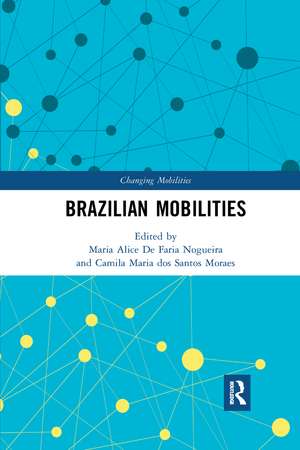Brazilian Mobilities: Changing Mobilities
Editat de Maria De Faria Nogueira, Camila dos Santos Moraesen Limba Engleză Paperback – 30 sep 2021
Addressing such different areas as tourism, urbanization, media studies, social inequalities, marketing and mega-events, transport and technology, among others, the contributors use the new mobilities paradigm, or NMP (Sheller & Urry, 2006) as a starting point to reflect about the social changes experienced in the country and they also engage with newer literature on mobilities, including work done by Brazilian and Latin-American authors depending on the subject of each individual chapter.
Illustrating to scholars the uniqueness and complexity of the Brazilian social-political and economic context, the book was organized in order to be a representative sample of the studies carried out in Brazil, as well as to contribute to other academic investigations on (im)mobilities and different social realities in emerging countries.
| Toate formatele și edițiile | Preț | Express |
|---|---|---|
| Paperback (1) | 382.95 lei 6-8 săpt. | |
| Taylor & Francis – 30 sep 2021 | 382.95 lei 6-8 săpt. | |
| Hardback (1) | 763.81 lei 6-8 săpt. | |
| Taylor & Francis – 21 feb 2020 | 763.81 lei 6-8 săpt. |
Din seria Changing Mobilities
-
 Preț: 311.14 lei
Preț: 311.14 lei -
 Preț: 151.73 lei
Preț: 151.73 lei - 18%
 Preț: 259.98 lei
Preț: 259.98 lei -
 Preț: 384.86 lei
Preț: 384.86 lei - 20%
 Preț: 274.06 lei
Preț: 274.06 lei -
 Preț: 385.62 lei
Preț: 385.62 lei -
 Preț: 383.93 lei
Preț: 383.93 lei - 17%
 Preț: 295.84 lei
Preț: 295.84 lei -
 Preț: 384.86 lei
Preț: 384.86 lei -
 Preț: 380.45 lei
Preț: 380.45 lei -
 Preț: 382.90 lei
Preț: 382.90 lei -
 Preț: 384.48 lei
Preț: 384.48 lei - 20%
 Preț: 272.23 lei
Preț: 272.23 lei -
 Preț: 386.14 lei
Preț: 386.14 lei -
 Preț: 311.39 lei
Preț: 311.39 lei -
 Preț: 389.96 lei
Preț: 389.96 lei -
 Preț: 389.66 lei
Preț: 389.66 lei
Preț: 382.95 lei
Nou
Puncte Express: 574
Preț estimativ în valută:
73.29€ • 79.58$ • 61.56£
73.29€ • 79.58$ • 61.56£
Carte tipărită la comandă
Livrare economică 22 aprilie-06 mai
Preluare comenzi: 021 569.72.76
Specificații
ISBN-13: 9781032174242
ISBN-10: 1032174242
Pagini: 204
Ilustrații: 26 Illustrations, black and white
Dimensiuni: 156 x 234 x 11 mm
Greutate: 0.3 kg
Ediția:1
Editura: Taylor & Francis
Colecția Routledge
Seria Changing Mobilities
Locul publicării:Oxford, United Kingdom
ISBN-10: 1032174242
Pagini: 204
Ilustrații: 26 Illustrations, black and white
Dimensiuni: 156 x 234 x 11 mm
Greutate: 0.3 kg
Ediția:1
Editura: Taylor & Francis
Colecția Routledge
Seria Changing Mobilities
Locul publicării:Oxford, United Kingdom
Public țintă
Postgraduate and UndergraduateCuprins
Introduction; 1. Moving On: How Mobile is Tourism Research on Transport in Brazil; 2. The Mobilities of the Favela and the Social Life of Souvenirs; 3. Green Favelas: Past, Present, and Futures of Favela Tourism in Rio de Janeiro; 4. Rio de Janeiro’s Mobilities After COR: Social Impacts of a Smart City Initiative; 5. "I Live Here, But I’ve Never Been Inside It": Narratives on Social Tourism of the Homeless Population in the Metropolitan Area of Rio de Janeiro, Brazil; 6. Vulnerabilities in Movement: Experiences from the Research Project "I Exist and Move"; 7. The Use of Geographic Information System (GIS) for the Promotion of Citizenship Through the Improvement of the Conditions of Accessibility in Urban Spaces: An Application of the Project Ponto Certo; 8. Urban Mobility and Citizenship in Brazil: Advances in the Legal Framework; 9. It is More "Pokemón" than "Go"? New Mobilities Paradigm in Locative Games; 10. Advertising Discourse from the Perspective of the New Mobilities Paradigm; 11. #BHNASRUAS: Mobile Journalism During the June Journeys; 12. The Internet as a Facilitator of Mobilities in Rural Areas; 13. Why Are We Writing and Speaking in English? Coloniality of Academic Communication and Its Uneven Mobilities.
Notă biografică
Maria Alice de Faria Nogueira is a lecturer at Universidade Estácio de Sá (UNESA, Brazil). She is also National Coordinator of Social Communications Undergraduate Courses–Creative Economies Department at the same institution. Her research focuses on the interconnection of (im)mobility, communication, advertising and marketing.
Camila Maria dos Santos Moraes is a Tourism and Sociology Professor at Rio de Janeiro University (UNIRIO), where she coordinates the TurisData-RJ: Data base on Rio de Janeiro Tourism Reality and the Observatory of Favela Tourism.
Camila Maria dos Santos Moraes is a Tourism and Sociology Professor at Rio de Janeiro University (UNIRIO), where she coordinates the TurisData-RJ: Data base on Rio de Janeiro Tourism Reality and the Observatory of Favela Tourism.
Descriere
Brazilian Mobilities presents an overview of the diversity of Mobility studies developed in Brazil, it builds a picture of a strong Latin-American perspective emerging in the field of mobilities research, which provides unique insight into the complex dynamics of mobilities in the emerging countries from the Global South.
